Diwali Traditions & Customs - Festival of Lights Explained
Diwali, also known as the Festival of Lights, is filled with exciting traditions and deep symbolic meaning. In this guide, discover how families celebrate: from Lakshmi Puja and lighting earthen lamps to rangoli art, firecrackers, and exchanging festive gifts. Learn how Diwali is observed across India-each region adding its own special customs to this joyful festival.
What Is Diwali?
Diwali, also known as the festival of lights, gets its name from the Sanskrit word 'dipavali', which means 'a row of lamps'. Celebrated across India with immense joy and devotion, this festival symbolizes the victory of good over evil and knowledge over darkness.
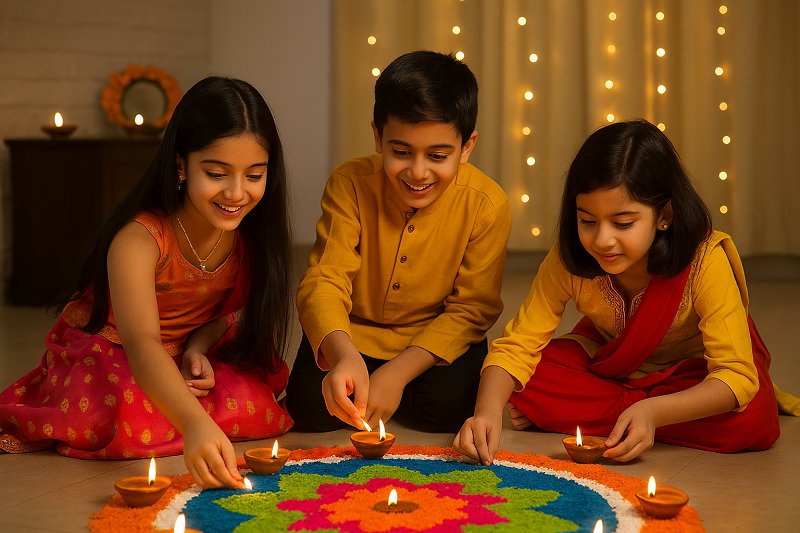
One of the most well-known legends associated with Diwali is the story of Lord Rama's return to Ayodhya after fourteen years of exile, which is why people light lamps and fireworks to celebrate his homecoming. In other parts of the country, different legends are honored. For example, some celebrate Lord Krishna's triumph over the demon Narakasura, while people in eastern India honor the goddess Kali's victory over Bakasura.
In addition to its rich cultural and religious traditions, Diwali is also known for its festive atmosphere, with sparkling lights, firecrackers, and sweets being a vital part of the celebration. The festival truly brings a bright and festive ambiance everywhere it's celebrated.
Popular Traditions of Diwali
This festival is not only about lighting of diyas and oil lamps, it is has lot more things to be done. Many traditions and customs are duly attached with the celebration. Different form of arrangements are needed so as to make this festival worth celebrating. Continue reading to find out more about the customs and get a better understanding about the festival. After reading make sure you refer this page to your friends by clicking here so that your friends as well get a better understanding about the festival.
Lakshmi Puja
Not only is Goddess Kali worshipped with prayers and mantras on the day of Diwali, but prayers are also offered to Goddess Lakshmi, the deity of wealth and prosperity. Many Hindu households believe that by performing a special puja (worship) to Goddess Lakshmi on Diwali evening, they will be blessed with good fortune and prosperity for the year to come. Thus a puja dedicating to Goddess Lakshmi is performed on the Diwali evening in all households so as to seek her blessings.
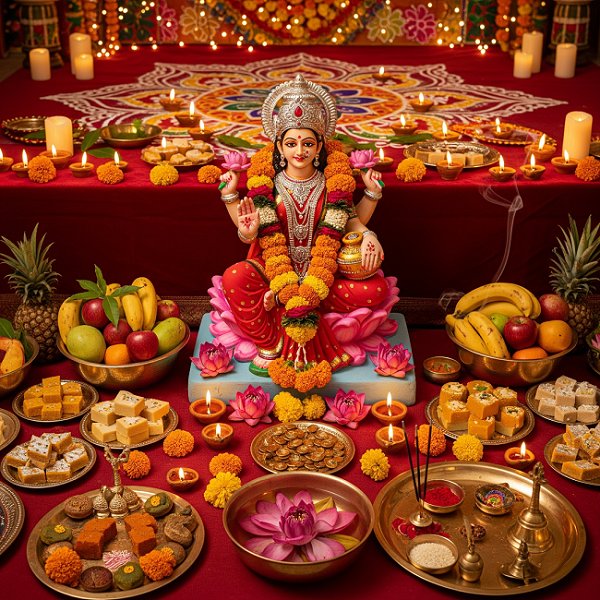
Lighting Diyas or Lamps
Following the Lakshmi puja, an important tradition of Diwali is the lighting of diyas, or oil lamps. People decorate their homes with these lamps, which symbolize the removal of darkness and the arrival of light.
This tradition has deep roots in mythology. It is believed that the people of Ayodhya lit diyas to welcome Lord Rama back home after his 14-year exile. This act of lighting up the entire town became a cherished tradition that continues today.
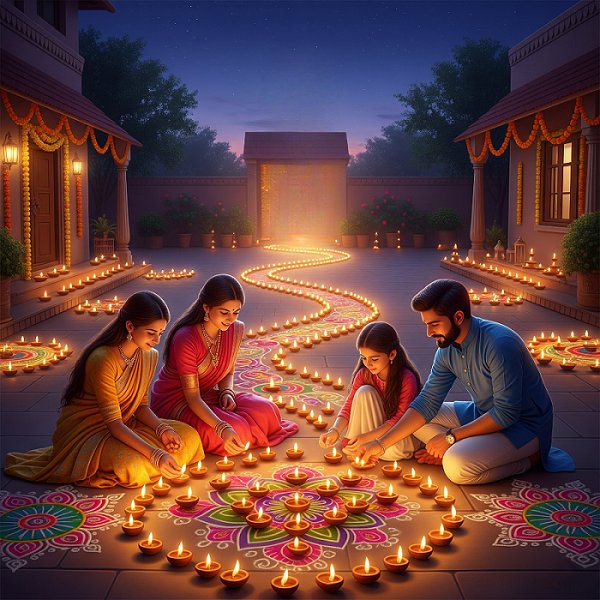
Another belief is that since Diwali falls on a new moon night, the light from the diyas guides Goddess Lakshmi to people's homes. To ensure she finds her way, many people keep their diyas burning all night long.
Worshipping Of Cattle
Another prevalent tradition that is observed in some of the villages is the worshipping of cattle by respective farmers. According to this Diwali tradition, farmers generally worship their cattle for they are their primary source of wealth and hence are considered to be equal to God.
Mostly the southern part of India, cows are worshipFirecrackersped on this day for they are regarded as the incarnation of Goddess Lakshmi.
Exchanging Gifts
Another tradition that is duly associated with the celebration of Diwali is the tradition of exchanging gifts. Thus this particular festival makes shopping as a part and parcel of this auspicious festival. In order to gift ones loved one the best, people indulges in shopping, buying clothes or other accessories so that this particular tradition is just fully observed. Diwali is also considered an auspicious occasion to buy gold.
Rangoli
Conceived from a Sanskrit word, rangoli refers to a decorative design created on the floor using a variety of materials. These intricate patterns are typically made from colored rice, dry flour, sand, or flower petals.
During Diwali, households meticulously clean their homes and then decorate the courtyards, walls, and entrances. Colorful rangolis, along with hangings and torans, are a central part of these decorations. This tradition is a way of creating a beautiful and sacred space to welcome Goddess Lakshmi into the home, as she is believed to visit those who have prepared their homes beautifully.
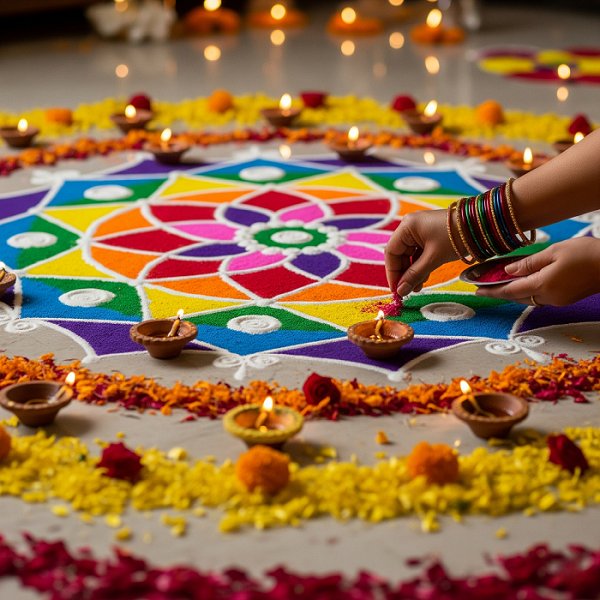
Firecrackers
No Diwali celebration is complete without fireworks and crackers. Bursting firecrackers is a vital and integral part of the festival, creating a spectacular display of light and sound.
This tradition has a symbolic meaning: it's believed that the noise and light from the crackers drive away evil spirits, thereby bringing prosperity and wealth into the home.
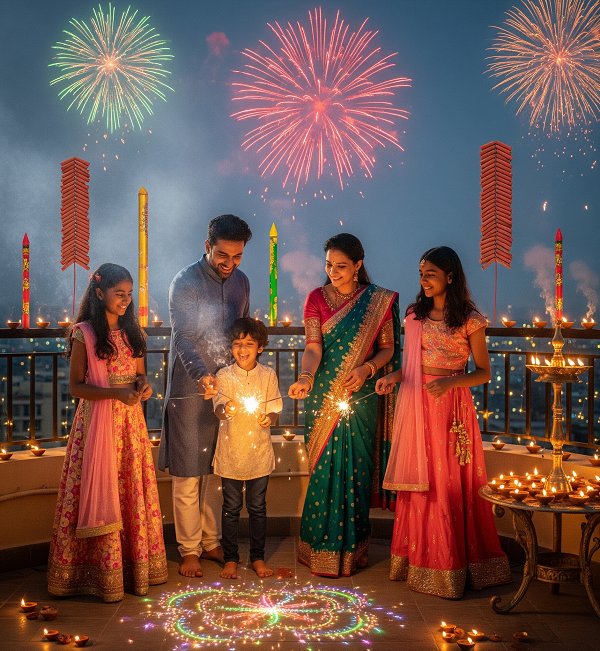
Other Traditions
Thus in order to get a proper understanding of the tradition and custom of this festival A pandit is duly consulted who informs the devotees about the timings and rituals that needed to be considered. The general things that are needed for a diwali puja are silver and gold coins, suparis, uncooked Rice, paan leaves, kumkum for applying tilak, mithaai (Indian sweets), camphor, agarbattis (incense sticks), dry fruit (almonds, cashews), flower petals and Lakshmi-Ganesh icon.
The puja ritual is performed in the evening when tiny diyas of clay are lit to drive away the shadows of evil spirits. Bhajans are sung in praise of the goddess and sweets are offered to her. Diwali puja consists of a combined puja of five deities: Ganesha is worshipped at the beginning of every auspicious act as Vighnaharta; Goddess Lakshmi is worshipped in her three forms Mahalakshmi, the goddess of wealth and money, Mahasaraswati, the goddess of books and learning and Mahakali. People also worship 'Kuber'- the treasurer of the gods.
 Change Language:
Change Language:
Try out the other sections


 New Year 2026
New Year 2026 Valentine's Day
Valentine's Day Craft Ideas for Kids
Craft Ideas for Kids Benefits of Yoga for Kids
Benefits of Yoga for Kids School Projects & Homework Help
School Projects & Homework Help